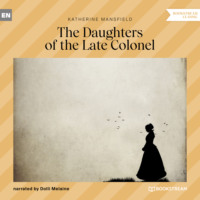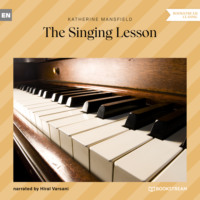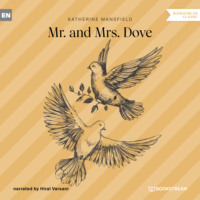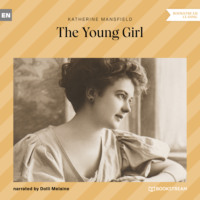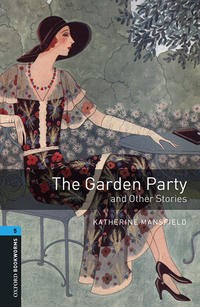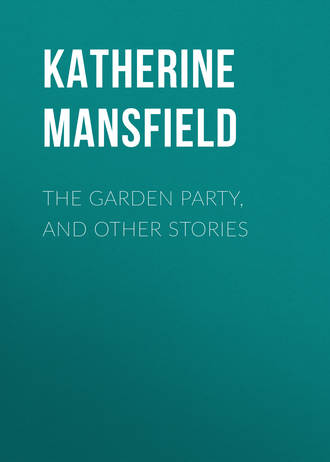 полная версия
полная версияThe Garden Party, and Other Stories
The mater, with her scissors outspread to snap the head of a dead something or other, stopped at the sight of Reggie.
“You are not going out, Reginald?” she asked, seeing that he was.
“I’ll be back for tea, mater,” said Reggie weakly, plunging his hands into his jacket pockets.
Snip. Off came a head. Reggie almost jumped.
“I should have thought you could have spared your mother your last afternoon,” said she.
Silence. The Pekes stared. They understood every word of the mater’s. Biddy lay down with her tongue poked out; she was so fat and glossy she looked like a lump of half-melted toffee. But Chinny’s porcelain eyes gloomed at Reginald, and he sniffed faintly, as though the whole world were one unpleasant smell. Snip, went the scissors again. Poor little beggars; they were getting it!
“And where are you going, if your mother may ask?” asked the mater.
It was over at last, but Reggie did not slow down until he was out of sight of the house and half-way to Colonel Proctor’s. Then only he noticed what a top-hole afternoon it was. It had been raining all the morning, late summer rain, warm, heavy, quick, and now the sky was clear, except for a long tail of little clouds, like duckings, sailing over the forest. There was just enough wind to shake the last drops off the trees; one warm star splashed on his hand. Ping!—another drummed on his hat. The empty road gleamed, the hedges smelled of briar, and how big and bright the hollyhocks glowed in the cottage gardens. And here was Colonel Proctor’s—here it was already. His hand was on the gate, his elbow jogged the syringa bushes, and petals and pollen scattered over his coat sleeve. But wait a bit. This was too quick altogether. He’d meant to think the whole thing out again. Here, steady. But he was walking up the path, with the huge rose bushes on either side. It can’t be done like this. But his hand had grasped the bell, given it a pull, and started it pealing wildly, as if he’d come to say the house was on fire. The housemaid must have been in the hall, too, for the front door flashed open, and Reggie was shut in the empty drawing-room before that confounded bell had stopped ringing. Strangely enough, when it did, the big room, shadowy, with some one’s parasol lying on top of the grand piano, bucked him up—or rather, excited him. It was so quiet, and yet in one moment the door would open, and his fate be decided. The feeling was not unlike that of being at the dentist’s; he was almost reckless. But at the same time, to his immense surprise, Reggie heard himself saying, “Lord, Thou knowest, Thou hast not done much for me… “ That pulled him up; that made him realize again how dead serious it was. Too late. The door handle turned. Anne came in, crossed the shadowy space between them, gave him her hand, and said, in her small, soft voice, “I’m so sorry, father is out. And mother is having a day in town, hat-hunting. There’s only me to entertain you, Reggie.”
Reggie gasped, pressed his own hat to his jacket buttons, and stammered out, “As a matter of fact, I’ve only come… to say good-bye.”
“Oh!” cried Anne softly—she stepped back from him and her grey eyes danced—“what a very short visit!”
Then, watching him, her chin tilted, she laughed outright, a long, soft peal, and walked away from him over to the piano, and leaned against it, playing with the tassel of the parasol.
“I’m so sorry,” she said, “to be laughing like this. I don’t know why I do. It’s just a bad ha—habit.” And suddenly she stamped her grey shoe, and took a pocket-handkerchief out of her white woolly jacket. “I really must conquer it, it’s too absurd,” said she.
“Good heavens, Anne,” cried Reggie, “I love to hear you laughing! I can’t imagine anything more—”
But the truth was, and they both knew it, she wasn’t always laughing; it wasn’t really a habit. Only ever since the day they’d met, ever since that very first moment, for some strange reason that Reggie wished to God he understood, Anne had laughed at him. Why? It didn’t matter where they were or what they were talking about. They might begin by being as serious as possible, dead serious—at any rate, as far as he was concerned—but then suddenly, in the middle of a sentence, Anne would glance at him, and a little quick quiver passed over her face. Her lips parted, her eyes danced, and she began laughing.
Another queer thing about it was, Reggie had an idea she didn’t herself know why she laughed. He had seen her turn away, frown, suck in her cheeks, press her hands together. But it was no use. The long, soft peal sounded, even while she cried, “I don’t know why I’m laughing.” It was a mystery…
Now she tucked the handkerchief away.
“Do sit down,” said she. “And smoke, won’t you? There are cigarettes in that little box beside you. I’ll have one too.” He lighted a match for her, and as she bent forward he saw the tiny flame glow in the pearl ring she wore. “It is to-morrow that you’re going, isn’t it?” said Anne.
“Yes, to-morrow as ever was,” said Reggie, and he blew a little fan of smoke. Why on earth was he so nervous? Nervous wasn’t the word for it.
“It’s—it’s frightfully hard to believe,” he added.
“Yes—isn’t it?” said Anne softly, and she leaned forward and rolled the point of her cigarette round the green ash-tray. How beautiful she looked like that!—simply beautiful—and she was so small in that immense chair. Reginald’s heart swelled with tenderness, but it was her voice, her soft voice, that made him tremble. “I feel you’ve been here for years,” she said.
Reginald took a deep breath of his cigarette. “It’s ghastly, this idea of going back,” he said.
“Coo-roo-coo-coo-coo,” sounded from the quiet.
“But you’re fond of being out there, aren’t you?” said Anne. She hooked her finger through her pearl necklace. “Father was saying only the other night how lucky he thought you were to have a life of your own.” And she looked up at him. Reginald’s smile was rather wan. “I don’t feel fearfully lucky,” he said lightly.
“Roo-coo-coo-coo,” came again. And Anne murmured, “You mean it’s lonely.”
“Oh, it isn’t the loneliness I care about,” said Reginald, and he stumped his cigarette savagely on the green ash-tray. “I could stand any amount of it, used to like it even. It’s the idea of—” Suddenly, to his horror, he felt himself blushing.
“Roo-coo-coo-coo! Roo-coo-coo-coo!”
Anne jumped up. “Come and say good-bye to my doves,” she said. “They’ve been moved to the side veranda. You do like doves, don’t you, Reggie?”
“Awfully,” said Reggie, so fervently that as he opened the French window for her and stood to one side, Anne ran forward and laughed at the doves instead.
To and fro, to and fro over the fine red sand on the floor of the dove house, walked the two doves. One was always in front of the other. One ran forward, uttering a little cry, and the other followed, solemnly bowing and bowing. “You see,” explained Anne, “the one in front, she’s Mrs. Dove. She looks at Mr. Dove and gives that little laugh and runs forward, and he follows her, bowing and bowing. And that makes her laugh again. Away she runs, and after her,” cried Anne, and she sat back on her heels, “comes poor Mr. Dove, bowing and bowing… and that’s their whole life. They never do anything else, you know.” She got up and took some yellow grains out of a bag on the roof of the dove house. “When you think of them, out in Rhodesia, Reggie, you can be sure that is what they will be doing… ”
Reggie gave no sign of having seen the doves or of having heard a word. For the moment he was conscious only of the immense effort it took to tear his secret out of himself and offer it to Anne. “Anne, do you think you could ever care for me?” It was done. It was over. And in the little pause that followed Reginald saw the garden open to the light, the blue quivering sky, the flutter of leaves on the veranda poles, and Anne turning over the grains of maize on her palm with one finger. Then slowly she shut her hand, and the new world faded as she murmured slowly, “No, never in that way.” But he had scarcely time to feel anything before she walked quickly away, and he followed her down the steps, along the garden path, under the pink rose arches, across the lawn. There, with the gay herbaceous border behind her, Anne faced Reginald. “It isn’t that I’m not awfully fond of you,” she said. “I am. But”—her eyes widened—“not in the way”—a quiver passed over her face—“one ought to be fond of—” Her lips parted, and she couldn’t stop herself. She began laughing. “There, you see, you see,” she cried, “it’s your check t-tie. Even at this moment, when one would think one really would be solemn, your tie reminds me fearfully of the bow-tie that cats wear in pictures! Oh, please forgive me for being so horrid, please!”
Reggie caught hold of her little warm hand. “There’s no question of forgiving you,” he said quickly. “How could there be? And I do believe I know why I make you laugh. It’s because you’re so far above me in every way that I am somehow ridiculous. I see that, Anne. But if I were to—”
“No, no.” Anne squeezed his hand hard. “It’s not that. That’s all wrong. I’m not far above you at all. You’re much better than I am. You’re marvellously unselfish and… and kind and simple. I’m none of those things. You don’t know me. I’m the most awful character,” said Anne. “Please don’t interrupt. And besides, that’s not the point. The point is”—she shook her head—“I couldn’t possibly marry a man I laughed at. Surely you see that. The man I marry—” breathed Anne softly. She broke off. She drew her hand away, and looking at Reggie she smiled strangely, dreamily. “The man I marry—”
And it seemed to Reggie that a tall, handsome, brilliant stranger stepped in front of him and took his place—the kind of man that Anne and he had seen often at the theatre, walking on to the stage from nowhere, without a word catching the heroine in his arms, and after one long, tremendous look, carrying her off to anywhere…
Reggie bowed to his vision. “Yes, I see,” he said huskily.
“Do you?” said Anne. “Oh, I do hope you do. Because I feel so horrid about it. It’s so hard to explain. You know I’ve never—” She stopped. Reggie looked at her. She was smiling. “Isn’t it funny?” she said. “I can say anything to you. I always have been able to from the very beginning.”
He tried to smile, to say “I’m glad.” She went on. “I’ve never known any one I like as much as I like you. I’ve never felt so happy with any one. But I’m sure it’s not what people and what books mean when they talk about love. Do you understand? Oh, if you only knew how horrid I feel. But we’d be like… like Mr. and Mrs. Dove.”
That did it. That seemed to Reginald final, and so terribly true that he could hardly bear it. “Don’t drive it home,” he said, and he turned away from Anne and looked across the lawn. There was the gardener’s cottage, with the dark ilex-tree beside it. A wet, blue thumb of transparent smoke hung above the chimney. It didn’t look real. How his throat ached! Could he speak? He had a shot. “I must be getting along home,” he croaked, and he began walking across the lawn. But Anne ran after him. “No, don’t. You can’t go yet,” she said imploringly. “You can’t possibly go away feeling like that.” And she stared up at him frowning, biting her lip.
“Oh, that’s all right,” said Reggie, giving himself a shake. “I’ll… I’ll—” And he waved his hand as much to say “get over it.”
“But this is awful,” said Anne. She clasped her hands and stood in front of him. “Surely you do see how fatal it would be for us to marry, don’t you?”
“Oh, quite, quite,” said Reggie, looking at her with haggard eyes.
“How wrong, how wicked, feeling as I do. I mean, it’s all very well for Mr. and Mrs. Dove. But imagine that in real life—imagine it!”
“Oh, absolutely,” said Reggie, and he started to walk on. But again Anne stopped him. She tugged at his sleeve, and to his astonishment, this time, instead of laughing, she looked like a little girl who was going to cry.
“Then why, if you understand, are you so un-unhappy?” she wailed. “Why do you mind so fearfully? Why do you look so aw-awful?”
Reggie gulped, and again he waved something away. “I can’t help it,” he said, “I’ve had a blow. If I cut off now, I’ll be able to—”
“How can you talk of cutting off now?” said Anne scornfully. She stamped her foot at Reggie; she was crimson. “How can you be so cruel? I can’t let you go until I know for certain that you are just as happy as you were before you asked me to marry you. Surely you must see that, it’s so simple.”
But it did not seem at all simple to Reginald. It seemed impossibly difficult.
“Even if I can’t marry you, how can I know that you’re all that way away, with only that awful mother to write to, and that you’re miserable, and that it’s all my fault?”
“It’s not your fault. Don’t think that. It’s just fate.” Reggie took her hand off his sleeve and kissed it. “Don’t pity me, dear little Anne,” he said gently. And this time he nearly ran, under the pink arches, along the garden path.
“Roo-coo-coo-coo! Roo-coo-coo-coo!” sounded from the veranda. “Reggie, Reggie,” from the garden.
He stopped, he turned. But when she saw his timid, puzzled look, she gave a little laugh.
“Come back, Mr. Dove,” said Anne. And Reginald came slowly across the lawn.
5. THE YOUNG GIRL
In her blue dress, with her cheeks lightly flushed, her blue, blue eyes, and her gold curls pinned up as though for the first time—pinned up to be out of the way for her flight—Mrs. Raddick’s daughter might have just dropped from this radiant heaven. Mrs. Raddick’s timid, faintly astonished, but deeply admiring glance looked as if she believed it, too; but the daughter didn’t appear any too pleased—why should she?—to have alighted on the steps of the Casino. Indeed, she was bored—bored as though Heaven had been full of casinos with snuffy old saints for croupiers and crowns to play with.
“You don’t mind taking Hennie?” said Mrs. Raddick. “Sure you don’t? There’s the car, and you’ll have tea and we’ll be back here on this step—right here—in an hour. You see, I want her to go in. She’s not been before, and it’s worth seeing. I feel it wouldn’t be fair to her.”
“Oh, shut up, mother,” said she wearily. “Come along. Don’t talk so much. And your bag’s open; you’ll be losing all your money again.”
“I’m sorry, darling,” said Mrs. Raddick.
“Oh, do come in! I want to make money,” said the impatient voice. “It’s all jolly well for you—but I’m broke!”
“Here—take fifty francs, darling, take a hundred!” I saw Mrs. Raddick pressing notes into her hand as they passed through the swing doors.
Hennie and I stood on the steps a minute, watching the people. He had a very broad, delighted smile.
“I say,” he cried, “there’s an English bulldog. Are they allowed to take dogs in there?”
“No, they’re not.”
“He’s a ripping chap, isn’t he? I wish I had one. They’re such fun. They frighten people so, and they’re never fierce with their—the people they belong to.” Suddenly he squeezed my arm. “I say, do look at that old woman. Who is she? Why does she look like that? Is she a gambler?”
The ancient, withered creature, wearing a green satin dress, a black velvet cloak and a white hat with purple feathers, jerked slowly, slowly up the steps as though she were being drawn up on wires. She stared in front of her, she was laughing and nodding and cackling to herself; her claws clutched round what looked like a dirty boot-bag.
But just at that moment there was Mrs. Raddick again with—her—and another lady hovering in the background. Mrs. Raddick rushed at me. She was brightly flushed, gay, a different creature. She was like a woman who is saying “good-bye” to her friends on the station platform, with not a minute to spare before the train starts.
“Oh, you’re here, still. Isn’t that lucky! You’ve not gone. Isn’t that fine! I’ve had the most dreadful time with—her,” and she waved to her daughter, who stood absolutely still, disdainful, looking down, twiddling her foot on the step, miles away. “They won’t let her in. I swore she was twenty-one. But they won’t believe me. I showed the man my purse; I didn’t dare to do more. But it was no use. He simply scoffed… And now I’ve just met Mrs. MacEwen from New York, and she just won thirteen thousand in the Salle Privee—and she wants me to go back with her while the luck lasts. Of course I can’t leave—her. But if you’d—”
At that “she” looked up; she simply withered her mother. “Why can’t you leave me?” she said furiously. “What utter rot! How dare you make a scene like this? This is the last time I’ll come out with you. You really are too awful for words.” She looked her mother up and down. “Calm yourself,” she said superbly.
Mrs. Raddick was desperate, just desperate. She was “wild” to go back with Mrs. MacEwen, but at the same time…
I seized my courage. “Would you—do you care to come to tea with—us?”
“Yes, yes, she’ll be delighted. That’s just what I wanted, isn’t it, darling? Mrs. MacEwen… I’ll be back here in an hour… or less… I’ll—”
Mrs. R. dashed up the steps. I saw her bag was open again.
So we three were left. But really it wasn’t my fault. Hennie looked crushed to the earth, too. When the car was there she wrapped her dark coat round her—to escape contamination. Even her little feet looked as though they scorned to carry her down the steps to us.
“I am so awfully sorry,” I murmured as the car started.
“Oh, I don’t mind,” said she. “I don’t want to look twenty-one. Who would—if they were seventeen! It’s”—and she gave a faint shudder—“the stupidity I loathe, and being stared at by old fat men. Beasts!”
Hennie gave her a quick look and then peered out of the window.
We drew up before an immense palace of pink-and-white marble with orange-trees outside the doors in gold-and-black tubs.
“Would you care to go in?” I suggested.
She hesitated, glanced, bit her lip, and resigned herself. “Oh well, there seems nowhere else,” said she. “Get out, Hennie.”
I went first—to find the table, of course—she followed. But the worst of it was having her little brother, who was only twelve, with us. That was the last, final straw—having that child, trailing at her heels.
There was one table. It had pink carnations and pink plates with little blue tea-napkins for sails.
“Shall we sit here?”
She put her hand wearily on the back of a white wicker chair.
“We may as well. Why not?” said she.
Hennie squeezed past her and wriggled on to a stool at the end. He felt awfully out of it. She didn’t even take her gloves off. She lowered her eyes and drummed on the table. When a faint violin sounded she winced and bit her lip again. Silence.
The waitress appeared. I hardly dared to ask her. “Tea—coffee? China tea—or iced tea with lemon?”
Really she didn’t mind. It was all the same to her. She didn’t really want anything. Hennie whispered, “Chocolate!”
But just as the waitress turned away she cried out carelessly, “Oh, you may as well bring me a chocolate, too.”
While we waited she took out a little, gold powder-box with a mirror in the lid, shook the poor little puff as though she loathed it, and dabbed her lovely nose.
“Hennie,” she said, “take those flowers away.” She pointed with her puff to the carnations, and I heard her murmur, “I can’t bear flowers on a table.” They had evidently been giving her intense pain, for she positively closed her eyes as I moved them away.
The waitress came back with the chocolate and the tea. She put the big, frothing cups before them and pushed across my clear glass. Hennie buried his nose, emerged, with, for one dreadful moment, a little trembling blob of cream on the tip. But he hastily wiped it off like a little gentleman. I wondered if I should dare draw her attention to her cup. She didn’t notice it—didn’t see it—until suddenly, quite by chance, she took a sip. I watched anxiously; she faintly shuddered.
“Dreadfully sweet!” said she.
A tiny boy with a head like a raisin and a chocolate body came round with a tray of pastries—row upon row of little freaks, little inspirations, little melting dreams. He offered them to her. “Oh, I’m not at all hungry. Take them away.”
He offered them to Hennie. Hennie gave me a swift look—it must have been satisfactory—for he took a chocolate cream, a coffee eclair, a meringue stuffed with chestnut and a tiny horn filled with fresh strawberries. She could hardly bear to watch him. But just as the boy swerved away she held up her plate.
“Oh well, give me one,” said she.
The silver tongs dropped one, two, three—and a cherry tartlet. “I don’t know why you’re giving me all these,” she said, and nearly smiled. “I shan’t eat them; I couldn’t!”
I felt much more comfortable. I sipped my tea, leaned back, and even asked if I might smoke. At that she paused, the fork in her hand, opened her eyes, and really did smile. “Of course,” said she. “I always expect people to.”
But at that moment a tragedy happened to Hennie. He speared his pastry horn too hard, and it flew in two, and one half spilled on the table. Ghastly affair! He turned crimson. Even his ears flared, and one ashamed hand crept across the table to take what was left of the body away.
“You utter little beast!” said she.
Good heavens! I had to fly to the rescue. I cried hastily, “Will you be abroad long?”
But she had already forgotten Hennie. I was forgotten, too. She was trying to remember something… She was miles away.
“I—don’t—know,” she said slowly, from that far place.
“I suppose you prefer it to London. It’s more—more—”
When I didn’t go on she came back and looked at me, very puzzled. “More—?”
“Enfin—gayer,” I cried, waving my cigarette.
But that took a whole cake to consider. Even then, “Oh well, that depends!” was all she could safely say.
Hennie had finished. He was still very warm.
I seized the butterfly list off the table. “I say—what about an ice, Hennie? What about tangerine and ginger? No, something cooler. What about a fresh pineapple cream?”
Hennie strongly approved. The waitress had her eye on us. The order was taken when she looked up from her crumbs.
“Did you say tangerine and ginger? I like ginger. You can bring me one.” And then quickly, “I wish that orchestra wouldn’t play things from the year One. We were dancing to that all last Christmas. It’s too sickening!”
But it was a charming air. Now that I noticed it, it warmed me.
“I think this is rather a nice place, don’t you, Hennie?” I said.
Hennie said: “Ripping!” He meant to say it very low, but it came out very high in a kind of squeak.
Nice? This place? Nice? For the first time she stared about her, trying to see what there was… She blinked; her lovely eyes wondered. A very good-looking elderly man stared back at her through a monocle on a black ribbon. But him she simply couldn’t see. There was a hole in the air where he was. She looked through and through him.
Finally the little flat spoons lay still on the glass plates. Hennie looked rather exhausted, but she pulled on her white gloves again. She had some trouble with her diamond wrist-watch; it got in her way. She tugged at it—tried to break the stupid little thing—it wouldn’t break. Finally, she had to drag her glove over. I saw, after that, she couldn’t stand this place a moment longer, and, indeed, she jumped up and turned away while I went through the vulgar act of paying for the tea.
And then we were outside again. It had grown dusky. The sky was sprinkled with small stars; the big lamps glowed. While we waited for the car to come up she stood on the step, just as before, twiddling her foot, looking down.
Hennie bounded forward to open the door and she got in and sank back with—oh—such a sigh!
“Tell him,” she gasped, “to drive as fast as he can.”
Hennie grinned at his friend the chauffeur. “Allie veet!” said he. Then he composed himself and sat on the small seat facing us.
The gold powder-box came out again. Again the poor little puff was shaken; again there was that swift, deadly-secret glance between her and the mirror.
We tore through the black-and-gold town like a pair of scissors tearing through brocade. Hennie had great difficulty not to look as though he were hanging on to something.
And when we reached the Casino, of course Mrs. Raddick wasn’t there. There wasn’t a sign of her on the steps—not a sign.


